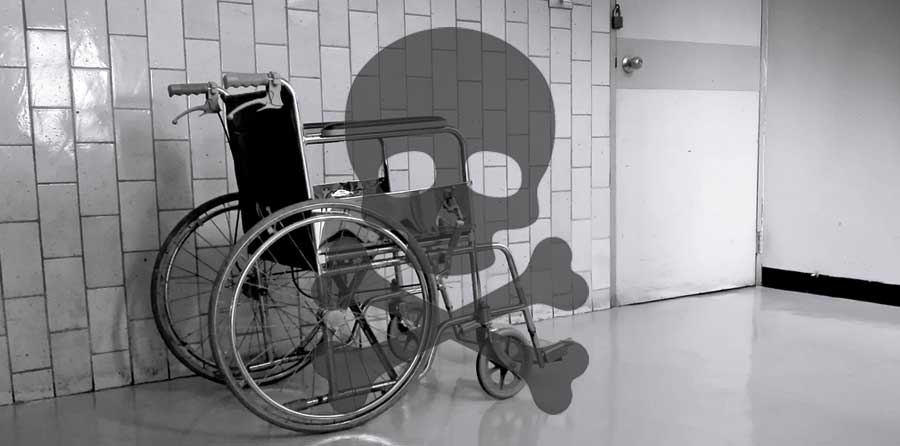
The news was devastating, and it came in dribs and drabs. First, there were three dead. Then five. Then seven. The tally now rests at eight.
They are five women and three men. They died inside a sweltering nursing home in Hollywood, Florida, in the days after Hurricane Irma, which ripped apart the Caribbean then, pounded the Florida Keys, and shut down power for much of mainland Florida. An estimated 6.5 million people in the Sunshine State lost power. Then the sun shone down. But in a state where people rarely feel it, accustomed to a life reliant on air-conditioning, they now felt it. And, of course, for the elderly, the heat was not just something to sweat over, it was a potential death sentence. Even three days after the storm, the Florida Health Care Association reported that of nearly 700 nursing facilities, about 150 lacked power. At facilities speckled across the state, air-conditioners were out, and the staff was trying to keep residents cool with fans and ice. “Extremely hot,” is how one police officer described conditions at the facility where the nursing home deaths occurred, the Rehabilitation Center at Hollywood Hills. Astonishingly, the center sits right across the street from a hospital. And through it all, the news media has flocked to the story like vultures to roadkill. One is even struck with the awful realization that the networks may be happy Irma finally produced a big dramatic story—you know, not just that petty stuff like trailer parks getting destroyed and the downtown section of one of America’s largest cities turning into a wave park. I tried googling “nursing home deaths,” in order to find out if there have been other instances of lethal neglect at senior care centers, but the first 11 pages of google searches were almost entirely filled with articles on the Florida story. Everyone from the New York Daily News to the Santa Cruz Sentinel to the Chicago Tribune to the Times of India has covered the story. And the media continues to cover the story in all its gritty details. But few publications have delved into the real problem, which is that America has abandoned its elderly. For one, there is the money of it. Nursing homes have become a cash cow, kind of like private prisons, only with better food and more TVs. “While not a glamorous business, nursing home chains can make money,” explains the Nursing Home Law Center, an organization of nursing home negligence attorneys. “Nursing homes are big businesses that provide valuable investment opportunities for private equity firms around the world.” In 2009, the U.S. nursing home industry provided more than $104 billion worth of health care to the elderly, as well as the infirmed, injured, and disabled. That figure is up by an astonishing 20 percent from just four years before. Of course, the money men are paying attention. There is a trend here. US industries that were once run by the government are more and more being privatized. We can again look to prisons or schools. And the nursing home industry is a particularly ripe fruit for entrepreneurs. America is aging, and the aging are helpless. “In many situations,” says the Nursing Home Law Center, “these companies have minimal accountability or no oversight at all compared to their competition other than the significant pressure placed on private equity investing entrepreneurs attempting to deliver high returns on their investment.” I am reminded of Rolling Stone writer Matt Taibbi famously describing Goldman Sachs, in the wake of the financial crisis, as a “great vampire squid wrapped around the face of humanity, relentlessly jamming its blood funnel into anything that smells like money.” These “for-profit companies have long had tumultuous issues,” says the Nursing Home Law Center, “especially multi-facility chains where the size of the parent company and their geographical scope of nationwide facilities makes it difficult to control serious problems [at] each individual nursing home.” As the law center explains, “without the need for public disclosure requirements that are required by publicly traded businesses, many investors can enjoy the lucrative incentive to increase their bottom line by cutting corners, oftentimes at the expense of the residents.” Which leads us back to the Rehabilitation Center at Hollywood Hills, which is a for-profit nursing home. According to a Reuters article, the facility had earned a “below average” mark of two out of five stars from the nursing home rating system for Medicare, the U.S. health insurance program for the elderly and disabled. The owner, according to Local10 News, a Miami station, “was involved [in] a massive fraud scheme” at a South Miami hospital. “Jack Michel…was investigated by a plethora of agencies,” reported the story, “including the U.S. Department of Health and Human Services, the Office of Inspector General, the Florida Medicaid Fraud Unit, and the FBI.” Despite all of this, Michel was able to keep his medical license. In 2015, he purchased the Rehabilitation Center at Hollywood Hills. “The nursing home’s previous CEO, Karen Kallen-Zury,” stated the Local10 story, “was sentenced to 25 years in federal prison after her 2013 conviction in a $67 million Medicare fraud scheme, a case that federal prosecutors described as a ‘massive criminal fraud conspiracy involving fake documents, fake patients, fake services, and bribes.'” The elderly were once looked after by their community or their kin; they are now looked after by people like Jack Michel and Karen Kallen-Zury. But oddly, this has become the American dream. Each winter, elderly “snowbirds” fly and drive to Florida to be in the warmth and near the beach. They buy second homes there or sell their first homes and move there. And when they get older, they often enter the state’s nursing home system. Florida is home to among the highest concentrations of senior citizens in the United States, with more than 1.6 million people ages 75 years or older, according to the 2015 U.S. Census. These people are extremely vulnerable. And the real question that should now be asked is: Can corporate America, with the “lucrative incentive to increase their bottom line by cutting corners,” truly protect these people? “The elderly in skilled nursing facilities are among the most vulnerable members of our society,” stated E.Z. Shapira in a 2000 research paper entitled Elder Abuse: Society’s Forgotten Issue. “They are dependent on the…nursing facility operator for their food, medicine, medical care, dental care, and a bed; a roof over their heads; for assistance with virtually every daily activity.” “They are particularly vulnerable,” wrote Catherine Hawes in a 2003 paper on elder abuse that was part of a National Research Council panel, “because most suffer from several chronic diseases that lead to limitations in physical and cognitive functioning and are dependent on others.” Hawes continued, “For decades, nursing homes have been plagued with reports suggesting widespread and serious maltreatment of residents, including abuse, neglect, and theft of personal property.” The paper goes on to define and describe what elder abuse looks like. “Physical abuse is generally thought to include hitting, slapping, pushing, or striking with objects.” There is also verbal or psychosocial abuse, “generally thought of as ‘intentional infliction of anguish, pain, or distress through verbal or nonverbal acts’ and includes threats, harassment, and attempts to humiliate or intimidate the older person.” Neglect is its own form of abuse. “Neglect,” stated the article, “is thought of as including ‘the refusal or failure of a caregiver to fulfill his or her obligations or duties to an older person, including …. providing any food, clothing, medicine, shelter, supervision, and medical care and services that a prudent person would deem essential for the well-being of another.’” A 2000 study done by the Atlanta Long-Term Care Ombudsman Program interviewed 80 residents in 23 Georgia nursing homes and, among other things, asked residents whether or not they had been abused. “They throw me like a sack of feed,” one resident reported, and “that leaves marks on my breast.” More than a third of the residents reported that they had seen other residents being abused, and nearly half said they had seen other residents being treated roughly. Interviews with family members of residents revealed observations of “bruises and abrasions, unexplained falls, some of which caused fractures.” In at least one incident, a resident was “left for days with broken bones before the family or resident’s physician were notified.” The journalist A.C. Thompson participated in a comprehensive assessment of assisted living facilities for an investigation with ProPublica and Frontline. “First off, a lot of these facilities are great,” Thompson told PBS Newshour in 2013. “But what we also found was that there was a pattern of problems that spanned the country. And what we kept seeing were allegations and citations for lack of staffing, not enough workers, a lack of training, workers who weren’t trained enough, medication errors, people getting the wrong drugs over and over again.” The reporting team discovered particularly disturbing stories at facilities that handled people with dementia. Take the case of George McAfee, an NFL Hall of Famer. “He developed dementia” at “an Emeritus facility in Georgia,” Thompson explained. “He drank toxic dishwashing liquid. Apparently, he didn’t realize what it was. It was supposed to be locked up, but it wasn’t, and he died as a result. He had chemical burns.” Emeritus received a fine of $601, said Thompson. Then there is the 2007 St. Louis case, drawn from the FBI’s White-Collar Crime Stories. “The 88-year-old woman at Claywest House nursing home near St. Louis was totally reliant on staff for her care,” noted the FBI. “There was nothing she could do about the ants crawling all over her. Or the waste she helplessly waited in during the weeks leading up to her death…The problem at Claywest and at two other area nursing homes was poor staffing. And as investigators would later learn, the shortage wasn’t an oversight. It was built into the system—a decision that led to horrific conditions at the nursing homes between 1998 and 2001 and federal charges that the homes and their upper management were padding their balance sheets on the backs of helpless residents in their care.” But who to hold accountable in situations like this, or the deaths that occurred at the Rehabilitation Center at Hollywood Hills? The workers, for not obtaining enough ice and fans to keep residents cool? The owners, for cutting corners and failing to provide the workers with the means to appropriately do their job? Or lawmakers, for not regulating the industry and allowing it to be overtaken by money-hungry for-profits companies that way too often appear to be run by convicted fraud artists? In Catherine Hawes’ 2003 National Research Council paper, one South Carolina nursing home worker provided a version of the story from their end. “Yeah, I’ve seen abuse,” they explained. “Things like rough handling, pinching, pulling too hard on a resident to make them do what you want. Slapping, that too. People get so tired, work mandatory overtime, and are short-staffed. It’s not an excuse, but it makes it so hard for them to respond right.” Meanwhile, hurricane season churns on, with Maria already waiting in the wings—By the weekend, the National Hurricane Center expects Hurricane Maria to be a major hurricane, located just about 500 miles from the Florida coast. And on America turns, with employment rising and business booming, and the stock markets soaring. And inevitably, on America ages. As “the baby booming aging population grows larger every year,” notes the Nursing Home Law Center, “the demand for healthcare in nursing facilities is expected to grow substantially in the decades ahead.” We need to keep the pressure on our legislators to make sure the industry is properly regulated and prepared for that challenge.










Julia
It’s a shame that we work so hard during our lifetime, get old with nobody to help us and it comes down to nursing homes who just don’t care. To them we donate our money to be not taken care of properly…….what a shame . I guess those who are lucky enough to grow old with money will never have to live in this problem.